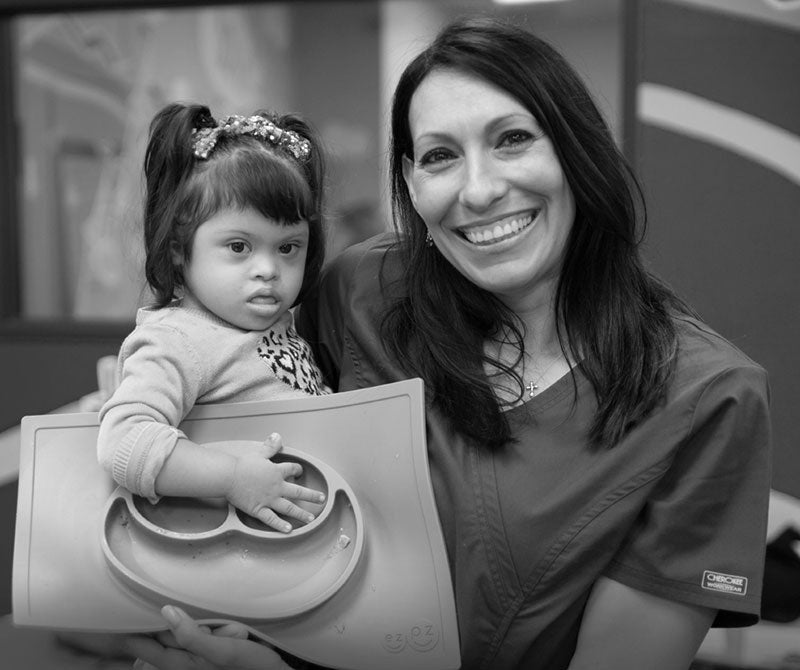Transitioning from the Tiny Cup to the Mini Cup
Once your child has mastered the skill of drinking from the Tiny Cup (baby is drinking independently with no help from adults), they are ready to drink more ounces of liquid at mealtime. That’s right – your child has graduated to the Mini Cup! Now your little one is ready to move on to their next drinking milestone.
Transitioning from the Tiny Cup to Mini Cup: Open-cup drinking is important, as it supports healthy oral and speech development, aids with teething, helps your child build a strong swallow and can decrease tooth decay. Here are some additional benefits of our cup training system.
- Tiny Cup: If your baby has been drinking from the Tiny Cup, they have been working the muscles of their lip, tongue, jaw, cheeks and soft palate to independently position the breastmilk (or formula) to the back of the tongue (a safe swallow). Your baby has learned a mature swallow pattern (just like the way you and I swallow), which doesn’t develop when drinking from a bottle or Sippy cup. So, congratulations to you both for achieving this feeding skill! Keep building these muscles and skills by moving on to the Mini Cup.
- Mini Cup: At 4 ounces, the Mini Cup is developmentally appropriate for toddlers (compared to the Tiny Cup, at 2oz, for infants). The Mini Cup teaches toddlers to drink more fluids from a bigger open cup, whereas the Tiny Cup is a training cup to teach baby to learn how to swallow liquids safely. Although developmental ages are approximate and vary with each child, here are the open-cup drinking milestones that both cups accelerate:
- Infant Drinking Milestone: Baby can drink from an open cup (held by an adult) at 4-6 months of age. The Tiny Cup was designed specifically to help baby meet this critical feeding milestone.
- Toddler Drinking Milestone: A 12-month old should drink independently from an open cup with minimal spillage. Since the Mini Cup has similar features to the Tiny Cup, this helps your toddler meet this developmental stage.
Liquids for the Mini Cup: I recommend serving the following beverages to your toddler: water, breastmilk, formula or whole milk. Try to avoid juices, sodas and caffeinated drinks, as these sugary liquids can lead to picky eating.
- Breastmilk: The American Academy of Pediatrics (AAP) states that parents can continue breastfeeding and offering breastmilk even after your child's first birthday. So, if you were breastfeeding and placing your breastmilk in the Tiny Cup, you can continue to put it into the Mini Cup as well. Cheers!
- Whole Milk: At around 12 months of age most parents decide to add whole milk (or nut milk) into their toddler’s diet. If your little one refuses it because they are used to the taste of formula or breastmilk, then take it slow by adding in ½ an ounce of milk and 3oz of breastmilk/formula into the Mini Cup (it holds 4oz but I give a ½ oz of room to decrease spillage). Change up the ratio over a few days (or weeks, following your toddler’s lead) by a ½ ounce until your toddler is able to drink 4oz of milk at a sitting.
- Water: Once your baby is 12+ months they can start drinking multiple ounces of water. Just keep an eye on them getting too full of water during mealtime. I usually fill the Mini cup with 3 ½ oz of water (or milk) at meals and will give them more (if requested) after mealtime. This allows them to be hungry enough to eat a variety of foods and not get satiated on liquids, which may help avoid picky eating.
- Purees: The Mini Cup is also perfect for introducing soups, smoothies and purees. These different liquid textures are important for your toddler to try drinking in order to improve their swallow. You can even offer them the Mini Spoon, too, since the skill of scooping matures around 11-18 months of age! Have your little one practice their spoon scooping skills with these thicker and more challenging textures.
Open-cup drinking takes patience, practice and repetition – just like everything else in parenting. But if you start cup drinking at 6 months of age with the Tiny Cup, you will have a toddler that is a successful and safe cup drinker with our Mini Cup! Tag us in your cup drinking adventures by using our hashtag #ezpzfun.
Happy Feeding!
Dawn Winkelmann, M.S, CCC-SLP
SPEECH LANGUAGE PATHOLOGIST & FEEDING SPECIALIST FOR EZPZ
Dawn Winkelmann, a.k.a “Ms. Dawn”, has treated thousands of kids across the globe by helping families overcome picky eating stages and food refusals, while adding new foods into their diet. Her high success rate is attributed to Ms. Dawn bringing her education, experience, sense of humor and her favorite feeding products to the family dinner table.
You will find Ms. Dawn’s expert feeding advice to be positive and fun for the entire family! She adapts complicated feeding/swallowing research and makes it practical and easy for parents! Get ready to learn the science behind your favorite feeding products and ways to bring happy family mealtimes back!



